Here are some thought-provoking quotes by the celebrated economist and writer Thomas Sowell, who turns 90 today.
The capacity to grasp and manipulate complex ideas is enough to define intellect but not enough to encompass intelligence, which involves combining intellect with judgment and care in selecting relevant explanatory factors and in establishing empirical tests of any theory that emerges. Intelligence minus judgment equals intellect. Wisdom is the rarest quality of all — the ability to combine intellect, knowledge, experience, and judgment in a way to produce a coherent understanding.... Wisdom requires self-discipline and an understanding of the realities of the world, including the limitations of one’s own experience and of reason itself. The opposite of intellect is dullness or slowness, but the opposite of wisdom is foolishness, which is far more dangerous.— Intellectuals and Society (pg. 2)
Some things are believed because they are demonstrably true. But many other things are believed because they are consistent with a widely held vision of the world — and this vision is accepted as a substitute for facts. Subjecting beliefs to the test of hard facts is especially important when it comes to economic beliefs because economic realities are inescapable limitations on millions of people's lives, so that policies based on fallacies can be devastating in their impacts. Conversely, seeing through those fallacies can open up many unsuspected opportunities for a better life for millions of people.…— Economic Facts and Fallacies (pg. vii, 1)
Fallacies are not simply crazy ideas. They are usually both plausible and logical — but with something missing. Their plausibility gains them political support. Only after that political support is strong enough to cause fallacious ideas to become government policies and programs are the missing or ignored factors likely to lead to "unintended consequences," a phrase often heard in the wake of economic or social policy disasters. Another phrase often heard in the wake of these disasters is, "It seemed like a good idea at the time." That is why it pays to look deeper into things that look good on the surface at the moment.
The fact that so many successful politicians are such shameless liars is not only a reflection on them, it is also a reflection on us. When the people want the impossible, only liars can satisfy them, and only in the short run.— May 22, 2012 article
How do you tell morality from sanctimoniousness? For one thing, morality is hard and sanctimoniousness is easy.... Morality means being hard on yourself. Sanctimoniousness means being easy on yourself — and hard on others....— "Morality vs. Sanctimoniousness" (speech)
Sometimes we can make a moral judgement about behavior, without being able to make a moral judgement about individual merit. I can say that drinking yourself into the gutter is not moral behavior. But it so happens that my body has a low tolerance for alcohol. It takes less alcohol to make me sick than it would take to make me drunk. Nature has made it almost impossible for me to become an alcoholic, without any moral virtue on my part. So, when I walk past a drunk lying in the gutter, I have no basis for being sanctimonious. How do I know that, if my body's tolerance for alcohol were greater, I might be lying there in the gutter and he might be walking past me under his own power?
Morally, it is still wrong to drink yourself into the gutter, no matter who does it. But this is one of many areas in which those who behave better may do so because of fortunate circumstances, which they did not create. They may be justified in saying, "There, but for the grace of God, go I." What they are not justified in doing is bending the rules to favor those whose behavior is a threat to themselves and society. It is right to try to help others raise themselves to a higher standard, but wrong to bring the standard down to where they are.
After my 85th birthday ... I looked back over my life and was surprised to discover in how many different ways I had been lucky, in addition to some other ways in which I was unlucky.— July 8, 2015 article
Among the things I did not know at the time was that I was adopted as an infant into a family with four adults, in which I was the only child.
All sorts of research since then has shown how the amount of attention and interactions with adults a child gets has a lot to do with the way the child develops....
It was decades later, when I had a son of my own, that I asked one of the surviving members of the family how old I was when I first started to walk. She said, “Oh, Tommy, nobody knows when you could walk. Somebody was always carrying you.” ...
Although I was raised by people with very little education, they were people who wanted me to get an education. They praised my every little accomplishment when I was very young, and I was taught to read by the time I was four years old, taught by someone with only a few years of schooling herself.
Years later, when I was promoted to the seventh grade, I was surprised by what a commotion it caused. Then I was told: “You have now gone further than any of us.”
(Photo of Sowell in 2018 from the Hoover Institution/YouTube via National Review.)


